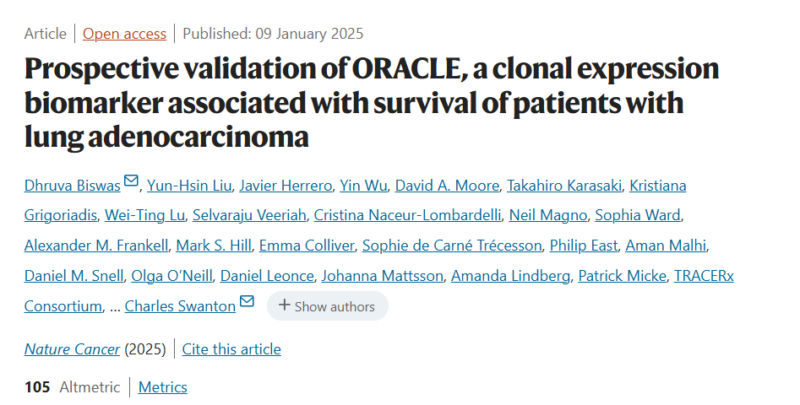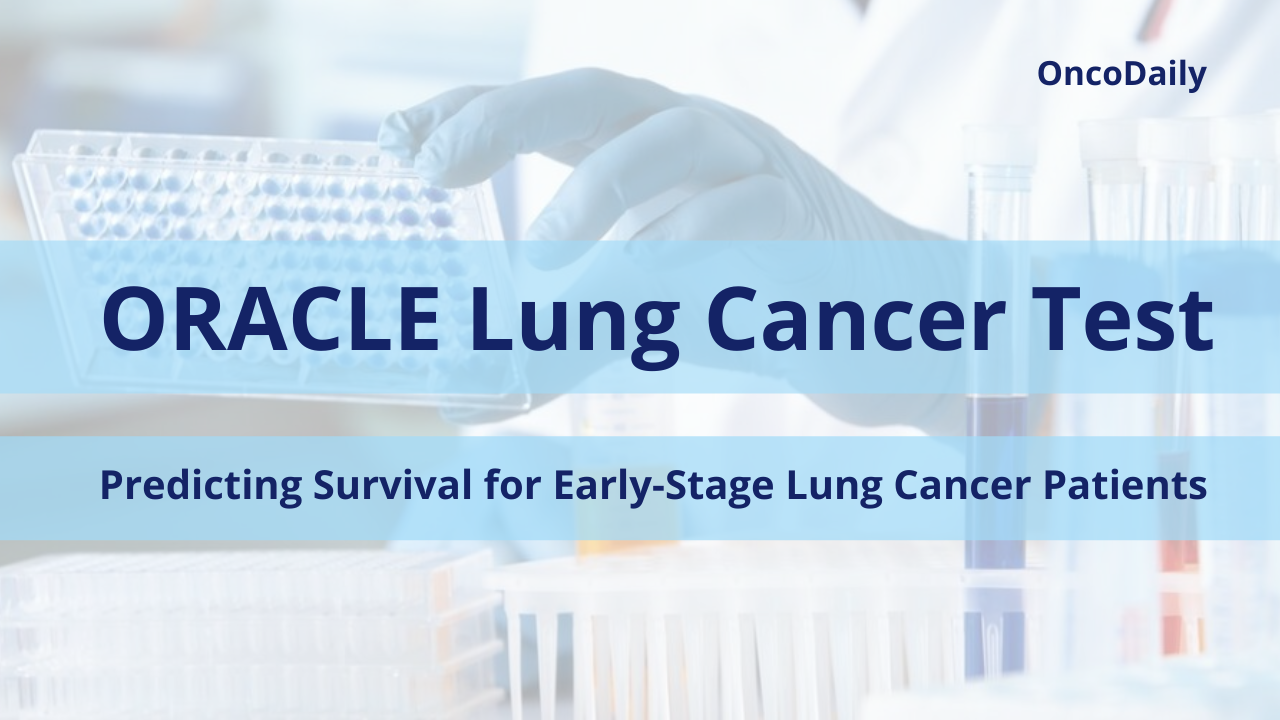Researchers at UCLH, the Francis Crick Institute, and the UCL Cancer Institute have developed a new test called ORACLE that could change how doctors predict survival in patients with stage 1 lung cancer.
This test has been shown to outperform current clinical risk factors, such as tumor stage, in predicting patient outcomes at the point of diagnosis, potentially aiding doctors in making more informed treatment decisions and reducing the chances of cancer recurrence or metastasis
“ORACLE can now predict survival rates in patients diagnosed at the earliest stage. If validated in larger cohorts of patients with lung cancer, doctors could one day use ORACLE to help make informed treatment decisions, bringing lessons from cancer evolution into the clinic,”– said Dhruva Biswas, Translation Fellow at the Crick, Postdoctoral Fellow at the UCL Cancer Institute, Associate Research Scientist at Yale School of Medicine, and co-first author.

What is the ORACLE Test?
The ORACLE test works by taking a biopsy of the tumor and analyzing it for 23 specific genes that are known to be linked to lung cancer mortality. By looking at how strongly these genes are expressed in the tumor, researchers can create a risk score that indicates how likely the cancer is to spread. This approach is significant because it provides more detailed information than traditional assessments, which often don’t account for the genetic diversity within tumors.
The study on the Outcome Risk Associated Clonal Lung Expression (ORACLE) biomarker has been published in Nature Cancer on January 9, 2025.
Authors: Dhruva Biswas et al

This research investigates the genetic and transcriptomic heterogeneity of lung adenocarcinoma (LUAD) by analyzing multiregion RNA sequencing data from 450 tumor regions across 184 patients involved in the TRACERx study.The authors demonstrate that ORACLE can effectively mitigate sampling bias associated with traditional single-site biopsies, providing a more reliable risk assessment for patients.
The study validates ORACLE’s association with overall survival, particularly in stage I LUAD patients, where it outperformed conventional staging methods. Additionally, ORACLE was shown to predict metastatic potential and chemotherapy sensitivity, highlighting its clinical relevance in guiding treatment decisions.This publication represents a significant advancement in understanding LUAD and offers a promising tool for improving patient management through personalized treatment strategies.
“Lung cancer is the leading cause of cancer-related death throughout the world, so it’s clear we need better markers to accurately classify tumours and predict who is at high risk. We’re now working with the Translation team at the Crick and industry partners to progress ORACLE into a test which could hopefully be used in the clinic as soon as possible,” – said Prof Charles Swanton, medical oncologist at UCLH, Principal Group Leader of the Cancer Evolution and Genome Instability Laboratory at the Crick, Chair in Personalised Cancer Medicine at the UCL Cancer Institute, and Chief Investigator of the CRUK TRACERx study.

Key Insights from the Research
- Better Predictions: In a study published in Nature Cancer, ORACLE was tested on 158 lung cancer patients as part of the TRACERx study. The results showed that ORACLE could predict patient survival more accurately than current clinical standards, making it particularly useful for those with stage 1 lung cancer. About 25% of these patients experience recurrence after surgery, so having a better predictive tool is crucial.
- Guiding Treatment Decisions: If ORACLE is adopted in clinical settings, oncologists could use this risk score alongside other factors to make more personalized treatment decisions. For instance, knowing which tumors are at higher risk could help doctors decide when to recommend chemotherapy or how closely to monitor patients after surgery.
- Tailored Chemotherapy: The researchers also discovered that tumors with high ORACLE scores were more likely to respond well to certain chemotherapy drugs, especially platinum-based treatments like cisplatin. This means that ORACLE could help tailor chemotherapy based on an individual’s tumor characteristics.
The research team plans to conduct larger trials to further confirm ORACLE’s effectiveness and explore its use in other types of cancers. Their ultimate goal is to make ORACLE a routine part of lung cancer care, giving doctors a powerful new tool for managing this challenging disease.In summary, ORACLE represents a significant step forward in lung cancer diagnosis and treatment. By providing a clearer picture of a patient’s risk profile, it holds the promise of improving outcomes for those facing this serious illness.
“We wanted to build on the previous work developing ORACLE and show that it can predict survival at the point of a lung cancer diagnosis. We’ve also shown that it can predict who would benefit from certain types of chemotherapy drugs or if someone’s cancer is likely to spread, giving a holistic measure of how a patient’s cancer might progress and respond,” – said, Yun-Hsin Liu, Research Assistant at the UCL Cancer Institute, and co-first author.

The ORACLE test, developed in 2019 by the TRACERx consortium – which includes researchers from UCLH, the Francis Crick Institute, and the UCL Cancer Institute- addresses a critical gap in lung cancer diagnostics.
The TRACERx study published in Nature Cancer in 2019 investigates the complexities of RNA intratumoral heterogeneity (RNA-ITH) in non-small cell lung cancer (NSCLC) by analyzing multiregion whole-exome and RNA sequencing data from 156 tumor regions across 48 patients enrolled in the study.
A clonal expression biomarker associates with lung cancer mortality
Authors: Dhruva Biswas et al.

Further Reading:
Immunotherapy for Lung Cancer: Patient Version
Large Cell Lung Carcinoma: What patients should know about
Adenocarcinoma of the Lung: What patients should know about
